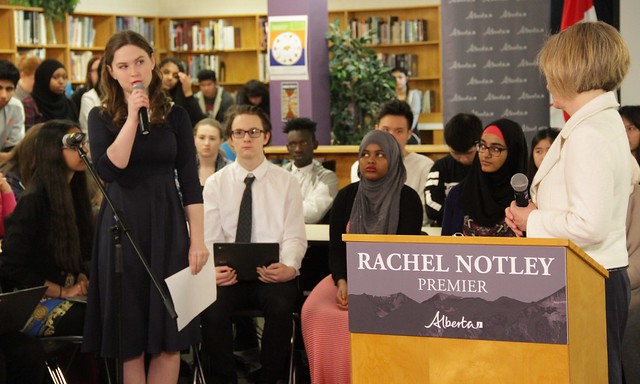By David Dodge & Dylan Thompson
There’s a stereotype about young people. They don’t care about the big issues facing the world. They’re apathetic, cynical, and uninterested. But some students in the Centre for Global Education’s Connect2 program are tackling the issue of climate change and taking their message straight to the big boss.
This past March, Connect2 students from Queen Elizabeth High School in Edmonton and around Alberta played host to a virtual town hall to share recommendations about how Alberta’s schools can show climate leadership.
Terry Godwaldt is a teacher at Queen Elizabeth High School. In a rousing speech, he explains to the students why their work is so important.
“Everything that you’re going to be writing down in your small groups is going to be recorded and is going to be received by our premier,” says Godwaldt, “I don’t know about you. But there aren’t a whole lot of times in our lives when we have an opportunity to have such a strong voice.”
Premier received student COP21 white paper on climate change
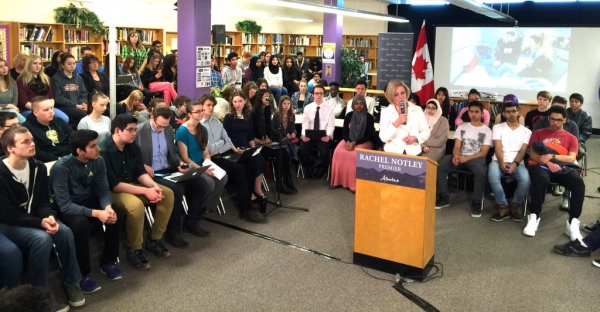
Alberta Global Connect students work on climate change education white paper Queen Elizabeth High School, Edmonton Photo David Dodge
Last November Connect2 students collaborated with other students from around the world to produce a white paper full of recommendations on how government should tackle climate change.
Students from Queen Elizabeth High School were set to travel to the climate talks in Paris to deliver their paper but the Edmonton Public School Board cancelled all travel to the country due to fears of terrorist activity following the 2015 Paris Attacks.
Hearing this, Premier Rachael Notley of Alberta came and received the students’ white paper herself at a virtual town hall of thousands of students from all over Alberta. Interestingly, the content of that student white paper was strikingly similar to the Alberta government’s freshly minted Climate Leadership plan. It would seem great minds really do think alike. This fact was not lost on Notley who was clearly moved by the work of the students.
This March she returned to Queen Elizabeth High School as the students prepare another white paper on what Alberta schools can do about climate change.
“You’ve produced, as I said the last time that I was here, one of the most extensive climate change documents ever written by young people, and I’m so proud of the leadership shown by Alberta’s students on this issue,” says Notley.
Climate change in every subject
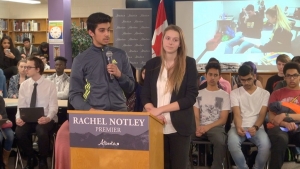
Mudassar Javid and Leah Buchanan doing intro to premier
Learning about climate change is critical to today’s youth says Leah Buchanan, a student at Queen Elizabeth High School in Edmonton: “We now acknowledge that climate change is an extremely important issue facing our world,” says Buchanan. “So educating the youth who are going to be our future is—I think—a major step in combating climate change. We’re looking at reworking the curriculum so that we teach the youth of our country, our upcoming youth all about how to respond to climate change,” says Buchanan.
Some students lament that climate change is just an afterthought in school courses today.
“Currently in subjects such as science, in grade 10, you start out with all your different cells and that stuff,” says Mudassar Javid, another Queen Elizabeth student. “At the end, there’s a small unit for climate leadership, which is handed out as a booklet to study on your own.”
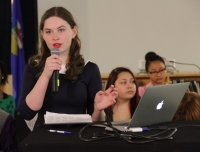
Stephanie Zewakuk addressing the virtual town hall on climate change. Photo David Dodge, GreenEnergyFutures.ca
Stephanie Zawaduk yet another student at Queen Elizabeth High School says climate change education shouldn’t just be taught in science class.
“We want to integrate talking about climate change in everything, because it is in everything,” says Zawaduk. “So no, it’s not always going to be in science class, ’cause not all these kids are going to be scientists, right? Not everyone is going to work in a lab or be a doctor, it doesn’t work like that.”
Javid and other students would like to see climate change education as its own unit in some courses and integrated across the curriculum. Premier Notley’s visit was especially pleasing for Javid because it showed a much different side to the government than he was used to seeing.
“The fact that she was so involved really surprised me, because the image that we get from the government isn’t one of focusing on environment, but it’s more of economics and that aspect of the society.”
What about solar on schools?
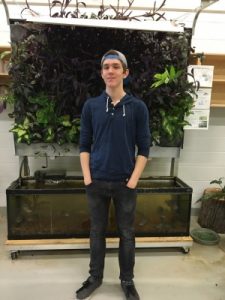
Colin Charlton of the Career and Technology Centre in Calgary
Colin Charlton a student at the Career and Technology Centre in Calgary had done his homework. He investigated how much solar could be installed on Alberta schools, and got right to the point when given the chance to question the premier.
“What do you think of using the CBE, Alberta’s largest school district, as a pilot project to increase solar usage in Alberta, as well as build kids’ awareness about energy efficiency and renewable energy?” Charlton asked. “Who do I talk to in your government about getting this low-cost energy and education idea off ground?”
Notley surprised Charlton with her answer: “It’s exactly that kind of idea that you’re going to see our energy efficiency group work with and then on top of it, there will be other programs to incent renewable energy productions.”
The premier then indicated she’d help set up a meeting with Environment Minister Shannon Phillips to discuss the idea.
Saying no to the malaise of apathy
It was a long and tiring day for the students, presenting their research to each other, asking questions of the premier of Alberta and struggling to come up with their very best ideas.
Once their research was complete, representatives from each student team assembled with graduate students from the University of Alberta and began the work of digesting the work down to a concise white paper on how schools can take action on Climate change in the curriculum and beyond.
The students’ ideas will be presented to David Eggen, the Alberta minister of education near the end of May. Whether the minister accepts their recommendations or not, these students are already deeply engaged in shaping the world they will inherit, when they are old enough to vote.

